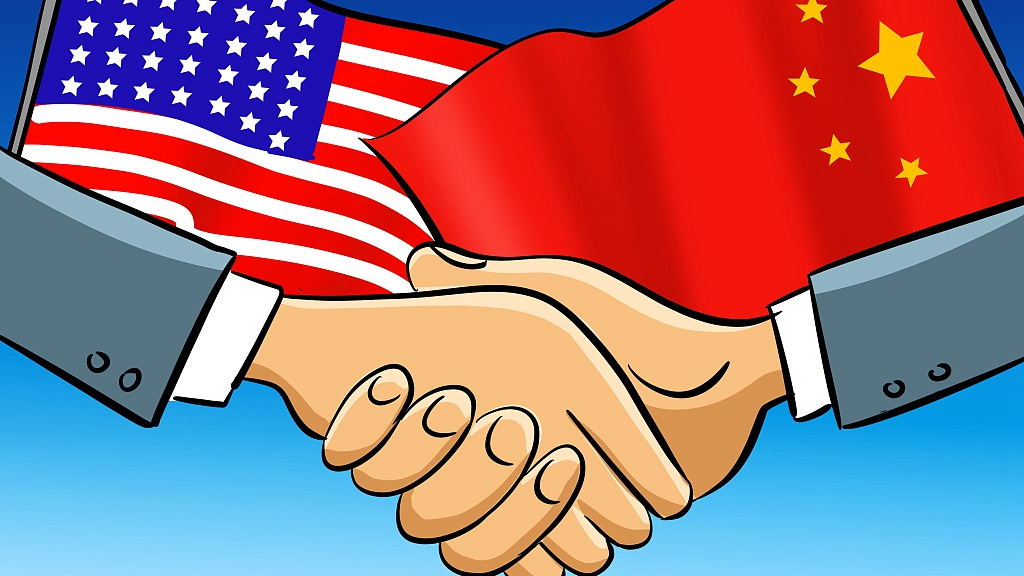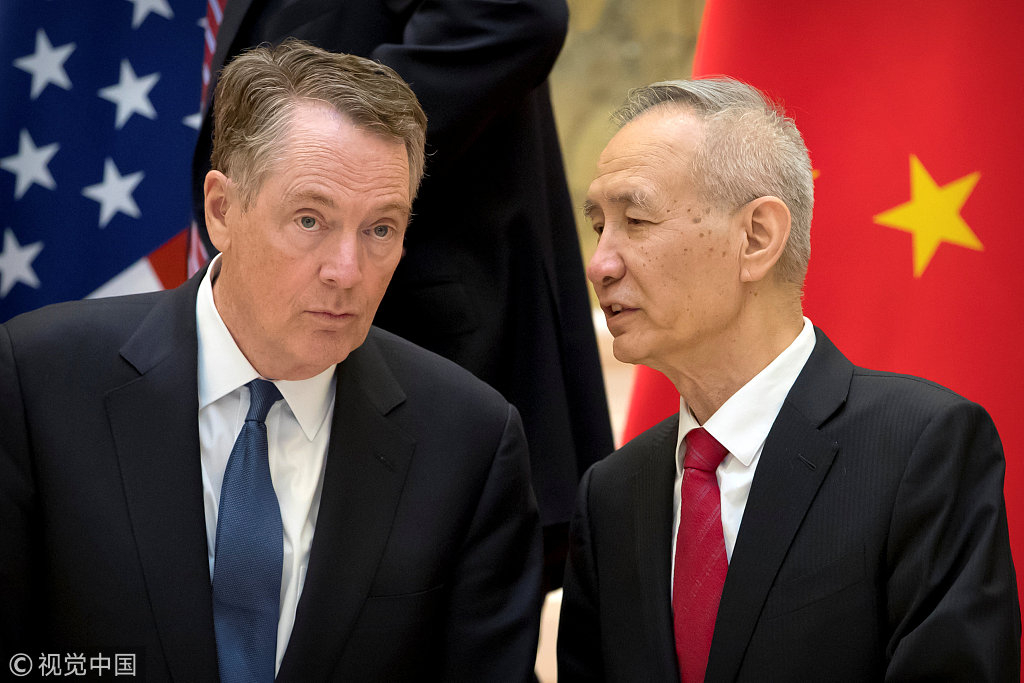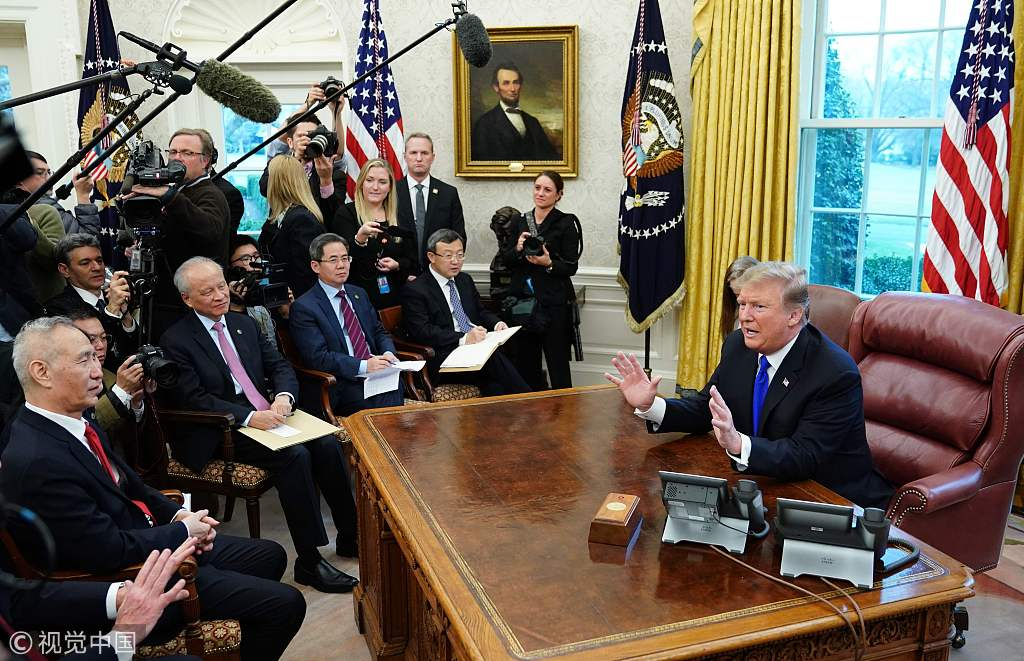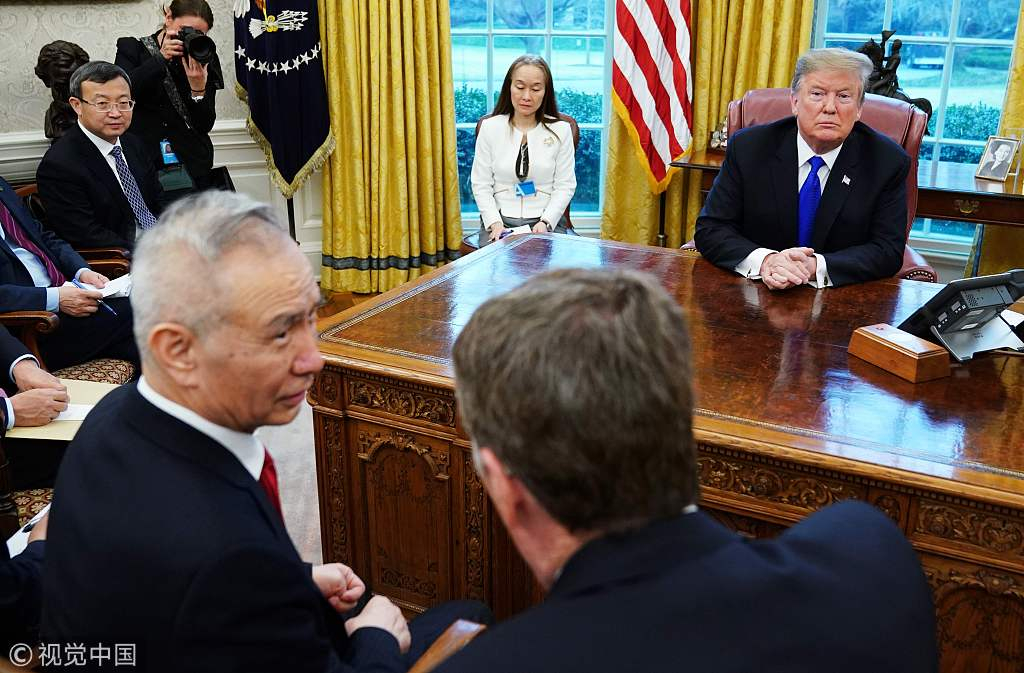
Opinion
11:46, 24-Feb-2019
Here's why the trade war is coming to an end
Tom Fowdy

Editor's note: Tom Fowdy, who graduated from Oxford University's China Studies Program and majored in politics at the Durham University, writes about international relations focusing on China and the Democratic People's Republic of Korea. The article reflects the author's views, and not necessarily those of CGTN.
Far removed from the hype of Trump's threats to tariff all imports from China last September, the atmosphere of the much covered trade war between Washington and Beijing feels remarkably different. All eyes and talks now converge toward a deal in the making between the two economic giants.
Differences of course remain, but the conclusion that such an agreement will be reached seems highly likely, again a far flung contrast when the U.S. set out that China had "90 days" to negotiate otherwise tariffs would be stacked up to 20 percent – this being seldom discussed in Washington's rhetoric.
How did we end up toward such an outcome? The answer is simple: Although the administration cannot admit it publicly, the U.S. continues to depend on stable and productive economic ties with China, for all their disdain toward Beijing, this is ultimately a structural limitation by which they cannot change.

U.S. Trade Representative Robert Lighthizer (L) with Chinese Vice Premier Liu He at the Diaoyutai State Guesthouse in Beijing, February 15, 2019. /VCG Photo.
U.S. Trade Representative Robert Lighthizer (L) with Chinese Vice Premier Liu He at the Diaoyutai State Guesthouse in Beijing, February 15, 2019. /VCG Photo.
The Trump administration may have talked tough and vowed to take a harder line against China, but some of this rhetoric has served the purpose of political theater. Recognizing the need to now re-stabilize trade between the two countries and knowing the damage caused by further escalation, Trump is now eager to clinch a deal so he can claim "political victory" and that his trade war was a success. With 2020 now starting to emerge on the horizon, he ultimately needs this year to champion the fruits of his manifesto.
Many hawkish voices do not like it and desire to change it, but economic interdependence between China and the U.S. is a reality, one which comes with a hefty price tag for Washington if it serves to push Beijing too hard. Although Trump and his administration have repeatedly tried to claim otherwise, a prolonged trade war poses risks for America.
2019 is a year whereby U.S growth is set to slow down. The impact of Trump's tax cuts is now dulling, the hefty government shutdown from December to January hurts it, consumption has not increased at a rate fast enough to keep up the current pace, then of course the trade war itself is making a contribution. Forecasts for global growth from all major economic institutions have revised it downward citing trade tensions as the culprit.

U.S. President Donald Trump (R) meets with Chinese Vice Premier Liu He (1st L) in the Oval Office of the White House in Washington, February 22, 2019. /VCG Photo.
U.S. President Donald Trump (R) meets with Chinese Vice Premier Liu He (1st L) in the Oval Office of the White House in Washington, February 22, 2019. /VCG Photo.
Thus, whilst Trump undoubtedly desired the trade war to hurt China somewhat to gain concessions, he knew his limitations and risks well. He had no desire for a prolonged struggle. As a result, he opted for a strategy that was short, quick and of course offered Beijing the chance to negotiate from early on to de-escalate the situation, repeatedly having tweeted through the months beforehand that China "wanted to make a deal."
Such tactics are a modus operandi of Trump's, whereby he threatens irrational consequences on an opponent, threatens continued escalation and then offers the hand of negotiation to them when they fear a crisis. He then afterward claims "he won" – although on most occasions the eventual deal is often less than what people anticipate.
As a result, when the administration again talked tough over a "90-day window" for China to negotiate with the U.S. and offer economic concessions, this wasn't so much a threat as it was a negotiating pitch dressed up for domestic political consumption. Why? Because although Trump claimed it was only China demanding a deal, he most desperately wants one too.
Presented with the opportunity, he isn't going to jettison these talks and escalate the trade war further, for as noted the consequences will be economically disastrous. He wants a deal that allows him to say that he won, a deal that calms the uncertainty of markets and makes stocks boom, a deal which he can claim brings jobs back to America and in turn a deal which allows him to pitch success on his initial term for 2020. Do you think for any reason he would instead increase tariffs and sink the American economy in view of a presidential election?

U.S. President Donald Trump watches as Chinese Vice Premier Liu He (L) speaks with U.S. Trade Representative Robert Lighthizer (R) in the Oval Office of the White House in Washington, February 22, 2019. /VCG Photo.
U.S. President Donald Trump watches as Chinese Vice Premier Liu He (L) speaks with U.S. Trade Representative Robert Lighthizer (R) in the Oval Office of the White House in Washington, February 22, 2019. /VCG Photo.
Given this, the trade war is likely to draw to an end. Does this mean renewed hostility to China from the administration will cease? In other areas, likely not. There is no doubt the most scathing anti-China voices will be disappointed as the trade war winds up. They were hoping it was designed to push Beijing to the verge of collapse and end inter-dependency between the two nations, but this is impossible. Instead, they overlooked that ultimately Trump is a person who cares about number one, that is himself.
In the view to 2020, he is shrewd not to press the self-destruct button on his own economy. He is a rational actor who plays politics by creating the image of being irrational. However, anti-China hawks around him and in the Congress will continue to press otherwise for the demonization of Beijing on a whole other range of areas. Economic ties might be stable, but renewed competition will not be.
(If you want to contribute and have specific expertise, contact us at opinions@cgtn.com.)

SITEMAP
Copyright © 2018 CGTN. Beijing ICP prepared NO.16065310-3
Copyright © 2018 CGTN. Beijing ICP prepared NO.16065310-3